
















Pure Salt, Iodized Salt, and Sea Salt
Copyright © April 1, 2011 by Robert Wayne Atkins, P.E.
All Rights Reserved.
Are You Worth Your Salt?
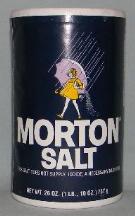 Have you ever heard the expression "Are you worth your salt?" and then wondered what it meant?
Have you ever heard the expression "Are you worth your salt?" and then wondered what it meant?
In olden days salt had to be transported long distances and it cost a lot of money. Therefore, in addition to a regular wage, a person also received a small ration of salt every day. Without that daily ration of salt a person's health would gradually start to decline. Therefore it became important that a person "earn his salt" every day.
The Importance of Salt
- Salt is one of the ingredients the human body needs to maintain long-term good health.
- Most people in the United States don't need any extra salt if they are eating commercially processed foods because those foods already contain salt.
- On the other hand, fresh vegetables and fresh meat and fresh home baked bread don't contain any salt. And the taste of fresh vegetables and fresh meat and fresh bread won't taste right to the average person if you don't add a little salt.
- Salt helps to extend the shelf life of foods.
- Salt helps to prevent the growth of harmful micro-organisms.
- At the present time salt is very cheap but during a disaster event salt may become very difficult to acquire.
The Shelf Life of Salt
Salt has an indefinite shelf life if properly stored. Salt may be vacuum sealed using an ordinary vacuum food sealer.
The Different Types of Salt
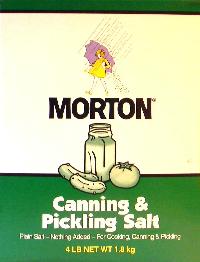 |
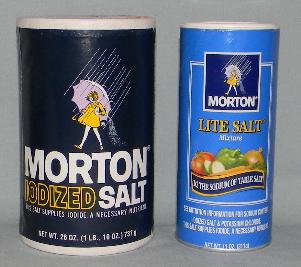 |
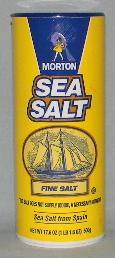 |
| Pure Salt | Iodized Salt | Sea Salt |
- Pure Salt may be used to help preserve food.
- Morton Canning and Pickling Salt is pure salt and it does not contain any extra ingredients. This pure salt may be used to help preserve food.
- Morton Salt is not pure salt. It contains salt and calcium silicate. (See the first picture at the top of the page.)
At the beginning of the year 2011 you could buy a four-pound box of "Morton Canning and Pickling Salt" for about $1.20 before tax.
- Iodized Salt should not be used as a food preservative.
However, iodized salt is the best salt to use when adding salt to your food just before you eat it. Your body needs a little iodine on a regular basis and a good way to get iodine is by adding a little iodized salt onto your food at the table.
- Morton Iodized Salt contains salt, calcium silicate, dextrose, and potassium iodide.
- Morton Lite Salt contains salt, calcium silicate, potassium chloride, magnesium carbonate, dextrose, and potassium iodide.
For use as a table salt, the Morton Lite Salt is recommended because it contains iodide and it can also be used to create an "electrolyte beverage." Therefore, in addition to Pure Salt, it would probably also be a good idea to purchase a few 11-ounce Morton Lite Salt containers and add them to your emergency food supply.
- Sea Salt may be used to help preserve food if it is pure salt.
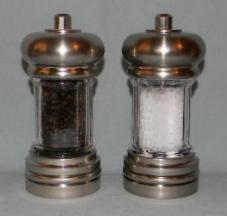
- Morton Sea Salt contains salt and yellow prussiate of soda as an anticaking agent.
Commercially processed sea salt is made from sea water by systematically removing the water and the impurities from the sea water until only sea salt remains. This process is carefully controlled and it is not the same process that appears on the internet for making sea salt at home. The internet instructions for making sea salt at home usually begin with a comment that you must use very clean sea water, or you must first verify that your sea water does not contain any impurities. Normal sea water contains a wide assortment of impurities and therefore it cannot be used to make pure sea salt following the very simple instructions you read on the internet.
If you purchase sea salt at the store then you may need a sea salt grinder similar to the one in the picture. This is the same grinder that is used to grind peppercorns and it can be purchased at most Walmarts for approximately $7.88 in the kitchen section where peppercorn grinders are sold. The sea salt grinder is usually sold with some sea salt inside the grinder as illustrated in the picture.
Respectfully,
Grandpappy.
Grandpappy's e-mail address is: RobertWayneAtkins@hotmail.com




































 Have you ever heard the expression "Are you worth your salt?" and then wondered what it meant?
Have you ever heard the expression "Are you worth your salt?" and then wondered what it meant?




